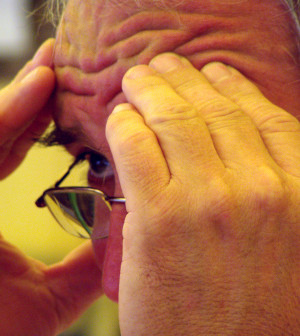- Could Your Grocery Store Meat Be Causing Recurring UTIs?
- Are You Making This Expensive Thermostat Error This Winter?
- Recognizing the Signs of Hypothyroidism
- 10 Strategies to Overcome Insomnia
- Could Artificial Sweeteners Be Aging the Brain Faster?
- Techniques for Soothing Your Nervous System
- Does the Water in Your House Smell Funny? Here’s Why
- Can a Daily Dose of Apple Cider Vinegar Actually Aid Weight Loss?
- 6 Health Beverages That Can Actually Spike Your Blood Sugar
- Treatment Options for Social Anxiety Disorder
Older Adults Sharpest in the Morning, Study Finds


Older adults’ minds may be sharpest in the morning, a new small study finds.
Canadian researchers used functional MRI to monitor the brain activity of 16 younger adults (aged 19 to 30) and 16 older adults (aged 60 to 82) as they did a series of memory tests while subjected to distractions.
When the tests were conducted between 1 p.m. and 5 p.m., older adults were 10 percent more likely to be distracted than younger adults. But that gap narrowed when the tests were conducted between 8:30 a.m. and 10:30 a.m., according to the study recently published online in the journal Psychology and Aging.
The findings offer strong evidence that older adults’ brain function can vary widely during the day, according to the researchers at the Baycrest Center for Geriatric Care in Toronto.
“Time of day really does matter when testing older adults. This age group is more focused and better able to ignore distraction in the morning than in the afternoon,” study author John Anderson, a Ph.D. candidate at Baycrest’s Rotman Research Institute and the psychology department at the University of Toronto, said in a center news release.
Older adults’ “improved cognitive performance in the morning correlated with greater activation of the brain’s attentional control regions — the rostral prefrontal and superior parietal cortex — similar to that of younger adults,” he explained.
In practical terms, Anderson said the findings suggest that mornings might be the best time for older adults to schedule their most mentally challenging tasks, such as doing taxes, taking a license renewal or other test, trying a new recipe, or seeing a doctor about a new health problem.
The findings should also be taken into account by researchers who study older adults’ mental function, another expert said.
“Since older adults tend to be morning-type people, ignoring time of day when testing them on some tasks may create an inaccurate picture of age differences in brain function,” study senior author Dr. Lynn Hasher, a senior scientist at the research institute, said in the news release.
More information
HealthinAging.org offers tips for keeping your brain young.
Source: HealthDay
Copyright © 2026 HealthDay. All rights reserved.










